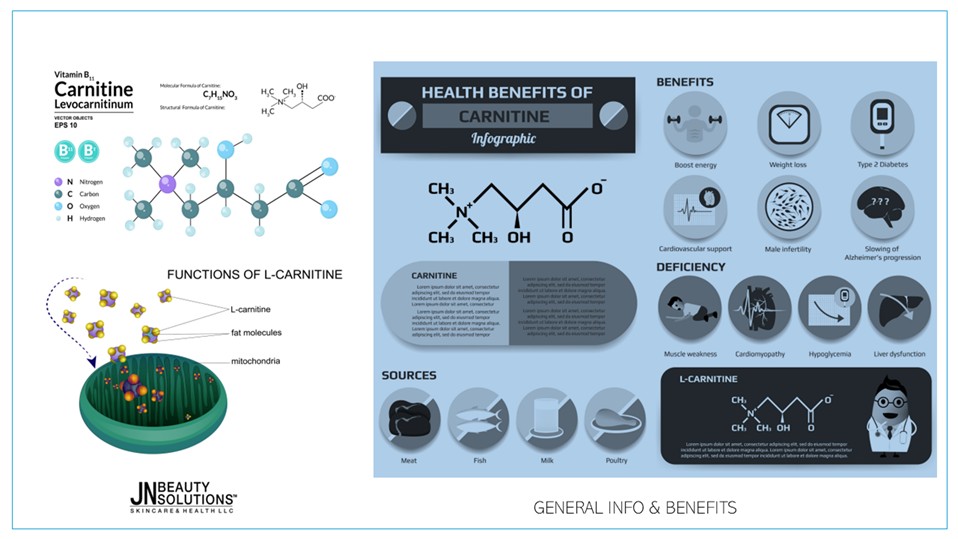OVERVIEW
L-Carnitine is a naturally occurring amino acid derivative that plays a vital role in cellular energy production, particularly in the transport of long-chain fatty acids into the mitochondria, where they are oxidized for energy. It is essential for the conversion of fat into usable fuel, making it a cornerstone compound for fat metabolism, cardiovascular support, muscle recovery, and brain function.
Though the body can synthesize L-Carnitine from the amino acids’ lysine and methionine, certain individuals—such as those with genetic defects, chronic illnesses, or under metabolic stress—may require supplementation for optimal physiological performance.

MECHANISM OF ACTION
L-Carnitine’s primary biological function involves fatty acid transport into mitochondria, enabling the process of beta-oxidation:
- Mitochondrial Fat Transport
L-Carnitine acts as a carrier molecule, binding to long-chain fatty acids in the cytosol and transporting them across the mitochondrial membrane via the carnitine shuttle system. Once inside, these fats are oxidized to generate ATP. - Metabolic Efficiency and Energy Support
By facilitating fat utilization, L-Carnitine helps preserve muscle glycogen, supports exercise endurance, and reduces lactic acid accumulation, contributing to improved performance and faster recovery. - Antioxidant and Neuroprotective Activity
L-Carnitine and its derivatives (like Acetyl-L-Carnitine) have shown to mitigate oxidative stress, reduce mitochondrial dysfunction, and support neurological health—especially in aging populations. - Detoxification and Cellular Repair
L-Carnitine supports metabolic detox pathways and enhances mitochondrial function in tissues under oxidative or inflammatory stress, such as the heart, liver, and muscles.
HISTORICAL BACKGROUND
L-Carnitine was first isolated from meat extracts in 1905 and later identified as a vitamin-like compound. In the mid-20th century, it became recognized for its critical role in fatty acid metabolism. By the 1980s and 1990s, it gained widespread attention in sports medicine, cardiology, and clinical nutrition for its therapeutic applications.
CLINICAL BENEFITS OF L-CARNITINE
1. Fat Metabolism and Weight Management
By enhancing the oxidation of stored fat, L-Carnitine supports lipolysis, improves body composition, and may aid in weight loss when combined with exercise and caloric control.
2. Cardiovascular Health
Supplementation may benefit individuals with ischemic heart disease, heart failure, and peripheral artery disease by improving oxygen delivery, reducing angina, and enhancing cardiac energy metabolism.
3. Exercise Recovery and Muscle Performance
L-Carnitine may reduce muscle soreness, support faster recovery, and enhance exercise output by minimizing free radical damage and delaying fatigue onset.
4. Male Fertility Support
Studies have shown that L-Carnitine may improve sperm motility and concentration, contributing to improved reproductive outcomes in men with subfertility.
5. Neuroprotection and Cognitive Function
The Acetyl-L-Carnitine form crosses the blood-brain barrier and supports brain energy metabolism, making it potentially beneficial for age-related cognitive decline, mild depression, and neuropathic pain.
NATURAL DIETARY SOURCES
- L-Carnitine is found naturally in animal-based foods, particularly red meat (beef, lamb), poultry, fish, and dairy products. The richest sources are muscle meats, as skeletal muscle stores over 95% of the body’s L-Carnitine.
- While omnivores typically obtain sufficient L-Carnitine from their diets, vegetarians, vegans, older adults, and individuals with metabolic disorders may benefit from supplementation.
INTRAVENOUS (IV) USE OF L-CARNITINE
In clinical and wellness settings, IV L-Carnitine is used to deliver higher bioavailable doses directly into the bloodstream for therapeutic benefits:
- Typical Dosage: Ranges from 500 mg to 2000 mg per session, depending on individual needs
- Use Cases: Fatigue, recovery support, weight loss protocols, cardiovascular disease, hepatic stress, or mitochondrial dysfunction
- Dilution: Usually mixed with normal saline (0.9% NaCl) or dextrose for infusion
- Frequency: Weekly or bi-weekly sessions are common in metabolic and regenerative therapy clinics
SAFETY AND TOLERABILITY
L-Carnitine is generally well tolerated when used orally or intravenously. Most individuals experience no side effects, though rare reactions may include:
- Gastrointestinal discomfort (especially at high oral doses)
- Fishy body odor (due to TMA production in the gut)
- Mild nausea or headache
- Seizure risk (in individuals with seizure disorders, particularly with Acetyl-L-Carnitine)
- IV use should be medically supervised, especially in patients with renal impairment, where carnitine excretion may be altered.
CONTRAINDICATIONS AND INTERACTIONS
Caution is advised in:
Chronic renal failure patients not on dialysis (may accumulate unmetabolized carnitine)
Individuals with seizure disorders, due to a potential lowering of the seizure threshold
Patients on thyroid hormone, as L-Carnitine may inhibit T3 and T4 uptake in tissues
Concurrent use with anticoagulants, which may increase bleeding risk (monitor INR closely)
Always consult a healthcare provider before initiating high-dose or IV L-Carnitine protocols.
CONCLUSION
L-Carnitine is a fundamental nutrient for fat metabolism, mitochondrial performance, and cellular energy balance. Whether used in athletic performance enhancement, weight management, cardiovascular support, or neuroprotection, L-Carnitine serves as a powerful tool in metabolic and functional medicine.
Delivered orally or intravenously, L-Carnitine supplementation helps bridge the gap between nutrition and clinical optimization, supporting the body’s natural ability to produce clean, efficient energy from fat.
For more information, please contact:
JN Beauty Solutions™

